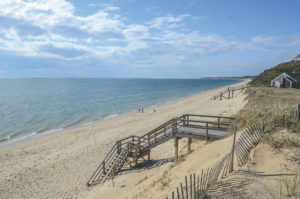TRURO — The Truro Conservation Trust closed on a bayside property on Nov. 1 for $250,000 — far below the original asking price for the 1.1-acre parcel next to Great Hollow Beach. The trust covered the entire cost, with no public money spent.
Last year, the property at 2 Kill Devil Road was listed at $869,000, and the town, in collaboration with the conservation trust, proposed purchasing it. The understanding was that this would roughly triple the size of the existing public beach.
Town meeting voters approved $242,000 in Community Preservation Act funds toward the purchase. But further legal research revealed that neighborhood covenants governed the use of the property, and that those covenants would not allow public use of the beach, Town Manager Rae Ann Palmer said on Monday.
Since town meeting voters had been sold on the idea that it would expand the public beach, the town’s attorney advised officials that, without beach access, the use of Community Preservation Act funds for the purchase was no longer valid.

“We only found out about that at the eleventh hour,” said Fred Gaechter, president of the trust, of the restrictive covenants.
The price of 2 Kill Devil Road was more than $1 million when the trust began eyeing it a decade ago. It fell gradually to under $600,000 before the owners offered the parcel to the conservation trust for $250,000.
“First, we made sure we heard it right,” Gaechter said of the trustees’ reaction to the final price reduction. “And then we were just thankful to the Wrights for the offer, because that’s what we knew we could raise.”
The land was owned by the painter Milton Wright and his wife, Breene Wright, Gaechter said. It once had a few cottages on it that are now gone. Conservation trustees are working on a plaque to place on the property in honor of the Wrights.
The conservation trust now owns the portion of the beach previously owned by the Wrights, and it plans to preserve the status quo, allowing people to use the beach just as the Wrights did, Gaechter said.
If any of the abutters or neighbors want to prevent the public use of their beaches, he said, they are entitled to install their own signs at their property lines and enforce their legal rights.
“The current situation between all the [neighborhood] association members is amicable since we have closed on the property,” Gaechter said Monday. “The ‘status quo’ has not been objected to and the trust’s status, as a nonprofit entity owning the property as open space in perpetuity, in the association has been agreed by all parties. No future confrontations, in this regard, are anticipated.”
Future use “will be no different than it was in the past,” Gaechter said.
This may be encouraging to beachgoers, because a year ago Anthony and Christopher Baker, brothers who own a three-acre compound just north of Great Hollow Beach at 3 Kill Devil Road, threatened to sue the town for attempting to make the Wright property a public beach.
Through their attorney, Lester J. Murphy Jr. of East Dennis, the Bakers informed neighbors they planned to “enforce” neighborhood covenants restricting public use. In a letter to Peter Rhoades of 4 Kill Devil Road, the Bakers asked to be granted an easement that would allow them to post “no trespassing” signs on the Rhoades beach and to patrol it to keep the public out.
“This grant of easement would give my clients the ability to restrict the use of the beach by members of the public,” Murphy wrote to Rhoades.
Rhoades, like many of his neighbors, favored the conservation trust acquiring the land and expanding the public beach. He rejected the Bakers’ proposal.
“Both [Baker] brothers have told my wife that they don’t want the public any closer, as they might put their towels down on their beach,” Rhoades told the Provincetown Banner last year.
Attempts to reach the Bakers were unsuccessful, and their attorney did not return a call for comment.



